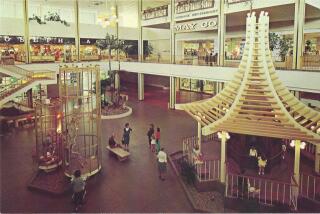Internet Casts Pall Over One Mall
- Share via
RICHMOND HEIGHTS, Mo. — As the Christmas season gets into full swing, the Saint Louis Galleria is taking a drastic step to fend off competition from the Internet: The shopping mall is barring stores from promoting e-commerce.
The upscale mall sent letters to its 170 stores last week and told them that no signs, decals, advertising or displays about the purchase of merchandise over the Internet are allowed.
Those who follow the industry said they are unaware of any similar action at any other mall in the country.
As of Wednesday, many stores clearly were ignoring the policy.
At the Athlete’s Foot, a 7-foot sign urged customers to “shop online any time.” The Sharper Image had banners urging online shoppers to register for a free chair. Eddie Bauer and FAO Schwarz shopping bags include the company Web addresses.
The educational toy retailer the Right Start has threatened to sue, and the Gap, which operates five stores in the mall, is deciding what to do about the policy.
“We think the Internet is a positive advertising tool that actually drives traffic to the stores,” Gap spokeswoman Maria Moyer-Angus said. “We think it’s an additional convenience to our customers.”
The fast-growing world of e-commerce still makes up a fraction of all retail sales. Sales at traditional stores totaled more than $170 billion last holiday season, while online sales reached about $3 billion. This year, experts predict everywhere from $3 billion to $8 billion in holiday e-commerce sales.
With e-commerce growing faster than many bricks-and-mortar retailers anticipated, many have tried to keep pace by selling goods online and using in-store promotions to direct shoppers to their Web sites.
After all, as far as the stores are concerned, the money all goes into one pot.
But for the malls that house those stores, it’s a different story. Money spent via the Internet bypasses the mall’s operating company, which typically gets a percentage of sales from tenants.
“While e-commerce is a new transactional medium that is here to stay, it is important we protect our interest while initiating important dialogue,” said Mark Zorensky, president of Hycel Properties Co., which owns the mall.
“We undertake considerable efforts to market Saint Louis Galleria and to bring people to the stores to drive sales locally. Our primary interest is to maximize local store sales in our mall.”
Emanuel Weintraub, a New Jersey-based consultant to retailers and suppliers, compared the Galleria’s policy to the practice at the beginning of the Industrial Revolution “when people would stick wooden shoes in the machines to make them stop.”
He also pointed out that retailers have a big advantage over Internet-only companies such as Amazon.com and EBay because Internet shoppers are often allowed to make returns at the nearest store. So many Internet shoppers end up at the mall after all.
Most mall companies are embracing the Internet, if somewhat reluctantly, said Malachy Kavanagh, a spokesman for the International Council of Shopping Centers.
“They’re realizing that retailers are telling them that the Internet is creating an educated consumer and is actually driving consumers to stores,” he said. “We’re still a society of tire-kickers. We have to go in and touch and feel and see a product before we buy it. Most developers have launched Web sites in concert with their tenants.”
In fact, the Galleria’s own Web site lists Internet addresses for its stores, including sites that offer e-retailing. “Visit our stores, shop our catalog, or order online at www.eddiebauer.com,” reads the Eddie Bauer location on the Galleria Web site.
In any case, the Internet certainly doesn’t seem to be keeping customers away from the mall.
On Wednesday, drivers were circling the huge parking lot, waiting for a precious spot to open. Inside, patrons were packed almost elbow-to-elbow along the buffed corridors and crowded into stores.
More to Read
Inside the business of entertainment
The Wide Shot brings you news, analysis and insights on everything from streaming wars to production — and what it all means for the future.
You may occasionally receive promotional content from the Los Angeles Times.










